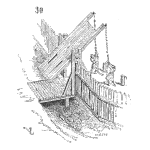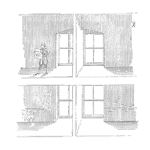
You may have been tapped one morning and given the assignment. You may have pursued the role either via a university program or by simply applying for the position.
Now what? How do you start in this role? What are you expected to do? [Read more…]
Your Reliability Engineering Professional Development Site
A listing in reverse chronological order of articles by:
by Fred Schenkelberg 4 Comments

You may have been tapped one morning and given the assignment. You may have pursued the role either via a university program or by simply applying for the position.
Now what? How do you start in this role? What are you expected to do? [Read more…]
by Fred Schenkelberg 11 Comments

A common and poor technique to gather field data is to count the number of returns by week or month. This can provide a graph showing the number of returns over time.
It hides information you need to understand your field failures.
Let’s take a look at a way to gather the same field failure data and retain the critical information necessary for time to failure analysis. [Read more…]

Implementing a new reliability development paradigm in a company which is using traditional, standards-based testing can be a perilous journey.
It is especially true with introducing HALT (Highly Accelerated Life Test) in which strength against stress, and not quantifying electronics lifetimes is the new metric. Because of this significant change in test orientation, a critical factor for success begins with educating the company’s top [Read more…]
by Fred Schenkelberg 2 Comments

Fielded products fail day by day. Customers report these failures generally seeking a way to remedy this issue. Gathering the reported or returned products or confirmed failures is common practice.
Depending on the product a simple replacement or exchange may suffice. For other products, repair or a refund may be appropriate.
In general, and not always, when a product fails in the hands of a customer, the organization designing, manufacturing and distributing the product learns of the failure. [Read more…]
by Fred Schenkelberg Leave a Comment

On occasion, you and the team sit down to review the design.
The idea is to check the design for any issues with the combined wisdom of the people involved. Or, it may be a status update for the entire team providing a focus on the most important issues and action items.
The review may involve all departments, such as marketing, operations, supplier management, and the design team.
It may involve just you and the electrical engineer in a private meeting. In either case, it is a review and a chance to illuminate salient reliability issues and form a consensus on the appropriate action. [Read more…]

It is easy to understand why the term HALT (Highly Accelerated Life Test) is so tightly couple to the equipment called “HALT chambers” systems. Many do not think they can do HALT processes without a “HALT Chamber”. Many know that Dr. Gregg Hobbs, who coined the term HALT and also HASS (Highly Accelerated Stress Screens), spent much of his life promoting the techniques and was also the founder of two “HALT/HASS” environmental chamber companies. [Read more…]
by Fred Schenkelberg 4 Comments

A plan is a guide or roadmap for intended action.
A reliability plan is also a collection of specific tasks and milestones and enhanced with a rationale to allow the entire team fully understand their role accomplishing the reliability objectives.
The plan is a way to achieve the desired business objectives. Meaning the product is reliable enough to meet customer expectations, minimize warranty expenses, and garner market acceptance. The plan is just a plan, it is the accomplishment of the tasks, the decision which improves the design, the signals monitored that stabilize the supply chain and assembly process, that make the difference.
A plan without action is not worth the effort. [Read more…]
by Fred Schenkelberg 2 Comments

Do you have one in your organization? Is it used regularly?
If not, your organization’s products are likely not as reliable as they should be. You are shipping products that are not as robust nor reliable as your customers deserve.
Derating and Safety Factors, defined earlier, provide a means to select components or create design features that have sufficient margin to accommodate variation in use and strength over time.
So why are these tools routinely ignored or given only fleeting attention? [Read more…]

Many reliability engineers have discovered HALT will quickly find the weaknesses and reliability risks in electronic and electromechanical systems from the capability of thermal cycling and vibration to create rapid mechanical fatigue in electronic assemblies. Assemblies that have latent defects such as cold solder or cracked solder joints, loose connectors or mechanical fasteners, or component package defects can be brought to a detectable, or patent, condition by which we can observe and potentially improve the robustness of an electronics system.
by Fred Schenkelberg Leave a Comment

Key Performance Indicators (KPIs) are measurable values related to essential business objectives.
A KPI provides a means to monitor the performance of a specific function.
In larger organizations, with sales & marketing, research & development, operations, supply chain and other teams working to bring products to market, each department has a specific role. [Read more…]

Let’s discuss the Arrhenius model. One thing you didn’t know about is that you may already be an expert in it. How could that be you ask? You have probably used it many times at home. [Read more…]

Traditional electronics reliability engineering began during the period of infancy in solid state electronic hardware. The first comprehensive guide to Failure Prediction Methodology (FPM) premiered in 1956 with the publication of the RCA release TR-1100: “Reliability Stress Analysis for Electronic Equipment” presented models for computing rates of component failures. “RADC Reliability Notebook” emerged later in 1959, followed by the publication of a military handbook know as that addressed reliability prediction known as Military Handbook for [Read more…]
by Fred Schenkelberg Leave a Comment

Next week is RAMS – the Reliability and Maintainability Symposium. A multitrack 3.5-day conference with classes, tutorials, paper sessions, a small trade show, plus many of you – peers, colleagues, and friends in the reliability world.
The conference is hosted by 9 professional societies and organized by a group of about 50 or so volunteers from those societies (I was an active member of the RAMS management committee for many years). [Read more…]
by Fred Schenkelberg 5 Comments

None, actually.
Or, one really good reliability engineering professional.
Or, an entire staff of highly talented reliability engineers.
The number of reliability engineers on staff really doesn’t matter. The outcome of your product and system reliability is not contingent on headcount or office space or list of degrees. [Read more…]

In all aspects of engineering we only make improvements and innovation in technology by building on previous knowledge. Yet in the field of reliability engineering (and in particular electronics assemblies and systems), sharing the knowledge about field failures of electronics hardware and the true root causes is extremely limited. Without the ability to share data and teach what we know about the real causes of “un-reliability” in the field, it is more easily understood why the belief in the ability able to model and predict the future of electronics life and MTBF continue to dominate the field of electronics reliability
 Ask a question or send along a comment.
Please login to view and use the contact form.
Ask a question or send along a comment.
Please login to view and use the contact form.